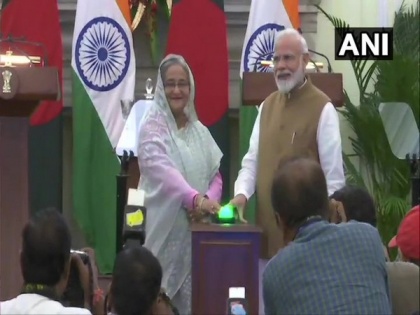The diplomatic, cultural significance of PM Modi's visit to Bangladesh
By ANI | Published: March 21, 2021 03:25 PM2021-03-21T15:25:17+5:302021-03-21T15:35:07+5:30
As Prime Minister Narendra Modi embarks on his two-day Bangladesh visit starting from March 26, the itinerary has multiple significance as it will not only be a diplomatic tour but also bridge the cultural connect of the two countries.

The diplomatic, cultural significance of PM Modi's visit to Bangladesh
As Prime Minister Narendra Modi embarks on his two-day Bangladesh visit starting from March 26, the itinerary has multiple significance as it will not only be a diplomatic tour but also bridge the cultural connect of the two countries.
Marked as PM Modi's first visit abroad in 15 months, he will be the Guest of Honour during the National Day programme on March 26, said the External Affairs Ministry. After one year he will resume his schedule which was called off due to the coronavirus pandemic.
PM Modi and Bangladesh PM Sheikh Hasina held a virtual summit on December 17 last year during which both sides highlighted plans for greater connectivity.
On March 26, PM Modi will participate in Mujib Borsho or the birth centenary of Bangladesh's father of the nation, Sheikh Mujibur Rahman, 50 years of diplomatic ties and 50 years of Bangladesh's war of liberation.
During his trip to Bangladesh, Modi will hold talks with his counterpart Sheikh Hasina and they are likely to sign Memorandum of Understandings between the two countries.
On the cultural tour, this is the first time that PM Modi will also visit places outside Dhaka. On March 27 he has planned to visit Rahman's memorial in the Bangabandhu shrine in Tungipara which is about 420 kilometres from Dhaka, known as Bangabandhu memorial.
Tungipara is the place of birth of Rahman, the architect of the 1971 Bangladesh War of Independence also the place where he lies buried at 'Bangabandhu mausoleum'.
Along with Tungipara, the Indian Prime Minister will also pay respect to Harichand Thakur at his shrine in Orakandi. Thakur was the founder of the Matua sect, a community that holds significance in the cultural ethos of Bengal.
Harichand Thakur's shrine in Orakandi is the founder of the Matua Mahasangha, which was a religious reformation movement that originated in Orakandi in about circa 1860.
On March 27, PM Modi will visit the famous Jeshoreshwari Kali temple in Satkhira.
During the visit to two temples, PM Modi is expected to exchange views with the locals as wells.
PM Modi was scheduled to attend the birth centenary celebrations of Bangabandhu Sheikh Mujibur Rahman last year. But his visit was called off due to the coronavirus pandemic.
Earlier on March 9, PM Modi inaugurated the 'Maitri Setu' between India and Bangladesh via video conferencing, with his counterpart Sheikh Hasina saying that political boundaries should not become physical barriers for trade.
The bridge is built over the Feni river, which flows between the Indian boundary in Tripura and Bangladesh.
( With inputs from ANI )
Disclaimer: This post has been auto-published from an agency feed without any modifications to the text and has not been reviewed by an editor
Open in app